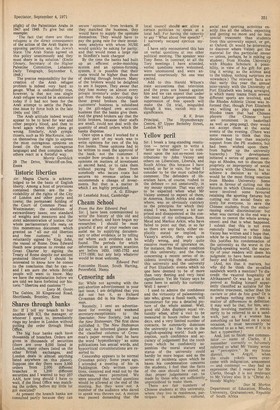Shares through banks
Sir: If I tell my branch to buy another 400 ICI, the manager, or whoever I speak to, immediately rings my broker in London without putting the order through Head Office.
The big four banks each have thousands of branches. Orders are given in thousands of securities (there are over 9,000 listed in London, many others listed on the other British exchanges, and London deals in almost anything listed anywhere on this planet). Suppose one day there were 3,000 orders from 2,000 different branches in 1,200 different securities and I wanted to buy 257 AAH, how long should I have to wait, if the Head Office was matching the orders, before my little lot got executed?
At present the branch banks are consulted partly because they can secure 'opinions ' from brokers. If they matched the business, they would have to supply the opinions themselves. They would have to pay the going rate for their investment analysts with whom NUBE would quickly be asking for parity; and that would mean a large rise in Skinflint's bank charges!
By the time the banks had built up an efficient order-matching system and an opinion-forming system, it is possible that their costs would be higher than those of dealing through brokers. Many of the brokers would be delighted to see it happen. They swear that they lose money on almost every private investor's order that they get from the banks. According to these grand brokers the bank customers' business is subsidised by the gilt-edged own account business that the banks give them. And the grand brokers say that the little brokers, because their staffs are small, could not deal with the quantity of small orders which the banks dispense.
Once upon a time I worked for a broker; part of my work was to write opinions for two of the big five banks. These opinions had to be written to meet the approval of the bank, not the customer. I wonder how prudent it is to take opinions on matters of investment at second hand, or to take them without paying for them from somebody who incurs costs but secures no revenue unless he recommends a change of investments. But that is a matter in which I am highly prejudiced.
A. G. Ellinger 30 Lensfield Road, Cambridge


































 Previous page
Previous page